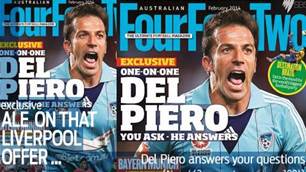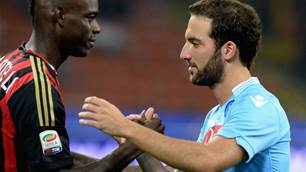Working 24/7, forever on the phone, globetrotting across the atlas and often pushing footballing laws to the absolute limit, a quiet man with a notebook is to thank for many of your team’s players.
It's a common sight on England's Merseyside. A vast playing field with a sea of youngsters competing ferociously in numerous six-a-side matches, their parents looking on with a ¬mixture of pride and anxiety. The sunshine means Martin Waldron is hiding behind designer sunglasses, but his Everton FC training top is clear for all to see. "Are you an Everton scout?" two eight-year-olds ask simultaneously. "Yep," replies Waldron and one youngster chokes on his sherbet dip.
But there's no time for chit-chat. "Summer is a mad time for me," says Waldron. "There are over 200 tournaments throughout the North West this summer. Some weekends I need to mobilise up to 80 scouts because we need every pitch covered. It's seven days a week and I'm never off the phone. My wife is used to it now."
Primarily, there are two types of scouts: player scouts and tactical scouts. But whether it's evaluating the talents of budding young stars, running the rule over potential first-team signings or preparing a dossier on their club's future opponents, there are no shortcuts. Scouting is one of the most labour intensive jobs in football. Multiple matches need to be watched, players assessed, agents, parents and contacts cajoled and reports made.
When it comes to scouting junior players Everton boast one of England's most comprehensive networks. The club have 160 scouts in the North West and in the past few years the policy has paid dividends with the likes of Wayne Rooney, Leon Osman, Tony Hibbert, Jack Rodwell, James Vaughan and Jose Baxter all graduating to the first team.
"When David Moyes joined Everton he said he wanted to have the best young English players around and that's what we've tried to do," says Waldron, who joined Everton in 1995. "Every young player we take on is signed on personally by David Moyes. They get to train with the first team, they get match tickets, we give them the personal treatment and it means our reputation for looking after players is second to none. We have everywhere in the North West covered."
Not all British clubs share Everton's outlook. More and more are opting to scout for players, junior and senior, from overseas. One reason is the dwindling birth rate in the UK that has seen the amount of boys entering reception class drop 23 per cent in recent years. "There used to be four senior schools in Kirkby and now there's two," laments Waldron. "You also get a lot of obese kids playing these days because so many of them are spending their time playing computer games. It's getting harder."
This sentiment isn't shared by all scouts, but Ron Bone, chief scout and head of recruitment at Middlesbrough's Academy, admits he struggles to keep hold of his older players. "With all the hype around football these days there are a lot of very young kids that are passionate about playing, so there's plenty of talent out there," he says. "The problem comes when they turn 16. The distractions of that age start to affect the commitment level of some lads and our junior leagues at that level are very poor."
Bone has made the best of his situation, discovering Stewart Downing, Lee Cattermole and Curtis Fleming among others and overseeing victory in the FA Youth Cup in 2004, but admits his job is getting harder. "At 16, the lads get interested in girls and going to watch the matches with their mates and it seems to have got worse over the past few years."
And that's not all. Rules governing the recruitment of youngsters mean clubs can only take players aged 12 to 16 that live within 90 minutes' travel time of the club's academy (60 minutes for seven to 11-year-olds). Those rules don't apply for foreign youngsters. "There are more foreign coaches these days and they are more likely to recruit foreign players," says Waldron. Sixty per cent of Premier League players are foreign but some academies are also swamped with youngsters from overseas.
After a disastrous World Cup, it seems the value and stock of English players has never been so low. Former England international Kevin Reeves, chief scout with Swansea City before moving with Roberto Martinez to Wigan Athletic last summer, believes the 90-minute rule is one reason why clubs are increasingly recruiting young players from abroad - but says finance is also key. "It all comes down to money," says Reeves. "When I was chief scout at Swansea we found a player called Angel Rangel. He was playing in the Spanish Third Division and we paid £10,000 ($16,000) for him. You can't find that kind of value for money in the UK."
For size and global reach, few clubs can match Arsenal's scouting network. When Arsene Wenger arrived in 1996 he brought an extensive set of overseas contacts that he's fully exploited. "It's like a big pyramid," explains Philippe Auclair, L'Equipe's London-based correspondent. "At the top is Arsene. Below him is chief scout Steve Rowley and below him are the so-called ‘super scouts' who cover all the main football regions: Francis Cagigao (Spain and Portugal), Gilles Grimandi (France, Israel and Africa), Peter Clarke (Holland), Danny Karbassiyoon (USA and Mexico) and Tony Banfield (Italy, Croatia and Slovenia). Below them are layers and layers of other scouts in every country. Many work on a freelance basis and work for various different clubs."
Some companies even provide scouting services on an ad hoc basis. The Scouting Network has 30 scouts in the UK and 25 overseas, all available to scout a team or a player for a fee. Scout7 is a live database that uses 30 researchers across the world to monitor nearly 70,000 players in 127 countries, and can boast Chelsea, Sevilla and Ajax among its clients. As the economic climate in football gets tougher these kind of auxiliary services grow in demand.
Last year, Chelsea sacked 15 scouts in an attempt to streamline operations and the further down the ladder you go, the less formal scouting networks become.
"When times are tight scouting is one of the first things to get cut back," says Derek Bragg of The Scouting Network. "That's been great for our business as more and more clubs can't afford a full-time scouting network, particularly in the lower and non-leagues. Also, club chairmen are increasingly reluctant to spend their money on players so they are using our service as a second or third opinion and to get a greater due diligence on any potential new signings."
Scouting networks vary in strength from country to country. Spanish clubs have an obvious advantage and emotional pull in much of South America. Lyon have uncovered world-class Brazilians like Fred, Ederson and Juninho, but overall French clubs lack a commercial presence and history of sporting achievement. Germany's proximity to eastern Europe gives them an advantage in that region, but when it comes to manpower and financial muscle, Premier League clubs rule the roost. "Everywhere I go I see English scouts," says Miroslav Vjatrovic, who has covered the Balkans for Liverpool. "English clubs have so many scouts and the money to attract the best. That's a huge advantage."
Contacts and continuity are everything in the world of scouting and Arsenal have fast mastered the rules of globalisation. Wenger's long-time friend Jean-Michel Guillou has an academy in Ivory Coast which has produced the likes of Kolo Toure and Emmanuel Eboue. Guillou has since established commercial partnerships with other clubs in Africa, Asia and Europe to keep Arsenal ahead of the game. They also send their coaches all over the world to work and expand their network of contacts. In short, no stone is left unturned.
"A couple of years ago a team from Bangladesh came to play some matches in England," says Philippe Auclair. "They were low-profile fixtures for the benefit of the local Bangladeshi community, but for some reason I went along. I was very impressed with the team's goalkeeper and I mentioned him to Arsene. I couldn't believe it when Arsene said he already knew of the player. He was from Bangladesh, for heaven's sake! I'm convinced there isn't a player on the planet that Arsenal don't know about."
Manchester United are fast catching up with Arsenal. They've made real progress in Brazil with the acquisitions of the Da Silva twins, Fabio and Rafael, and Rodrigo Possebon. They've recently signed a deal with Traffic, a TV rights company who own Sao Paulo-based youth club Deportivo Brasil, which has 120 teenagers. United will have first option on their players plus 90 others that Traffic own the economic rights to. The deal is within FIFA's rules but when it comes to scouting young players the rules are often being stretched and loopholes exploited.
United's Italian-based scout David Williams has been lauded by Sir Alex Ferguson for securing the signatures of Lazio teenager Federico Macheda and Roma striker Davide Petrucci. But in Rome, United's movements have caused consternation. "We tried ¬everything to stop Manchester United from taking our player but the present Italian regulations don't give you any type of defence," complained Lazio president Claudio Lotito. "We find ourselves in a proper cattle market." Italian clubs are prevented from tying a player under 18 to a contract. Petrucci was signed by United after his 16th birthday on a contract worth £95,000 ($155,000) a year (the maximum permitted for a youth team player) while his father was offered a job as groundsman at the club's training ground. In 2009, Chelsea were banned from signing players for a year after FIFA found their signing of Gael Kakuta from French club Lens breached the club's contract with the 18-year-old.
The ban was overturned after Chelsea agreed an out-of-court settlement but the signs are that FIFA are beginning to clamp down on clubs' recruitment techniques. Money talks and talent walks, and it's not just teens being bought. One scout, who asked to remain anonymous, told FFT he knew an eight-year-old being paid £1,000 ($1,600) a month to play for a Premier League club. The amount is big enough to secure the loyalty of the player and their parents but small enough to be put through the club's books as 'miscellaneous expenses'.
Much of a scout's work is shrouded in secrecy. FFT requested interviews with scouts at several Premier League clubs, but many declined. "It's like a secret society sometimes," says Reeves. "You can turn up to some games and recognise other scouts, but they can be very elusive. I suppose that's part of the job: to keep your cards close to your chest."
As scouting becomes increasingly global and sophisticated, keeping track of players has never been more technological. "We do an awful lot of work on the IT side of things," says Daniel Philpott, Everton's scout for 14- to 18-year-olds. "We have a full-time recruitment analyst who operates the computer system. It means we can keep up to date with all the players we're looking at. It's the only way to operate these days because it's so competitive. We can sign players from other clubs at the age of 16 but we need to be tracking them well before that."
Tactical scouts, who produce reports on clubs' upcoming opponents, are also becoming increasingly reliant on technology with reports often compiled on DVDs and even iPods. During the World Cup, FIFA provided a 'tactical feed' for every game. The whole match was filmed by an aerial 'spider-cam' with a perfect view of all 22 players' movements over the 90 minutes.
But for all the technology available, the art of scouting has changed very little over the years. "It's all about having an eye for a player," says Reeves. "I used to play professional football, but I don't think that really comes into it. It's something you can't teach or take qualifications for. You need to make your mind up about a player quickly because if you wait too long you could lose out. It's all about instinct."
Good scouts can save clubs millions of pounds and the further down the ladder you go, the harder scouting becomes. Oldham Athletic have a patch that allows them to recruit young players from Leeds to Llandudno but that doesn't make courting players any easier. "Every kid in this region wants to play for Manchester United, City or Liverpool," explains Latics chief scout Ron Millward, who has 18 scouts working for him. "We just try and convince the players and their parents that the jump to our first team is much smaller than at Manchester United. It's not easy but on average in the last 25 years we've discovered and developed four players for the first team every season. It's saved us thousands of pounds."
As the final whistle blows on an afternoon of matches on Merseyside, Waldron's Everton training top is still drawing stares from parents and players. Is this their moment? Will they be getting a call? "There's not a lot that's up to our standard here," says Waldron. But he's far from downbeat. There's another tournament in another town tomorrow. "The satisfaction you get from spotting a player as a kid, then seeing him making his first team debut is great. I spotted Jack Rodwell and Jose Baxter when they were only six years old. That makes it all worthwhile." And so the search continues.
Related Articles

Del Piero on that Liverpool offer

Inside the mind of El Shaarawy













